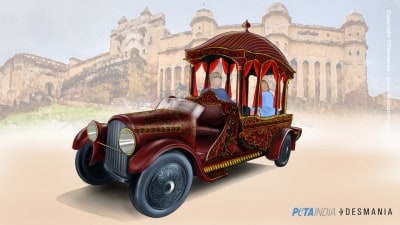Jaipur, Jan 29 : PETA India representatives, in an in-person meeting with Rajasthan Chief secretary Niranjan Arya, submitted a design of electric royal chariot for replacing elephants at the Amer Fort.
The unique design, which PETA India and Desmania Design suggested to be named “Maharaja”, resembles a royal chariot. The vehicle could ferry four tourists per trip and would be suitable for the hilly terrain like that at Amer Fort.
It needs to be mentioned here that the committee constituted by the Project Elephant Division of the Ministry of Environment, Forest and Climate Change recently recommended to phase out elephant rides at Amer Fort by replacing them with electric vehicle rides.
People for the Ethical Treatment of Animals (PETA) India, soon after the recommendations, collaborated with leading design company Desmania Design to create a modern electric vehicle.
PETA India representatives also submitted a factsheet to the Chief Secretary citing shocking instances in which captive elephants have reacted to their abuse at Amer Fort, leading to serious injuries, deaths, and destruction of property, and requested him to safeguard tourists and the general public from such health and safety risks.
“The respected chief secretary listened to PETA India, which represents kind people around the world, and now we hope tourists and elephants will be given the royal treatment with these majestic, cutting-edge cars, which can replace animals forced to give rides,” says PETA India Chief Advocacy Officer Khushboo Gupta.
“Desmania is delighted to offer this eco- and animal-friendly electric vehicle design, which would deliver a memorable experience for visitors while helping to end cruel and archaic elephant rides,” says Desmania Design Managing Director Anuj Prasad.
The Central government appointed the expert committee as per a March 6, 2020 order of the Supreme Court of India, and the committee report incorporated recommendations made by PETA India, including ending elephant rides, citing ageing elephants and tourists’ declining preference for these rides.
The committee’s recommendations include refraining from using elephants with irreparable eye problems for rides and banning any new additions of elephants for rides.
The report notes that of the 98 captive elephants inspected, 22 suffered from irreversible eye problems and 42 had foot problems, including overgrown nails and flat footpads from walking on concrete roads. Three elephants tested positive for tuberculosis, a disease that could be fatal for tourists who catch it.
Disclaimer: This story is auto-generated from IANS service.

